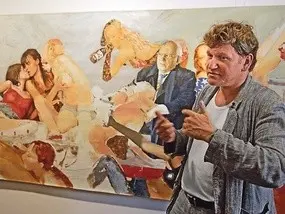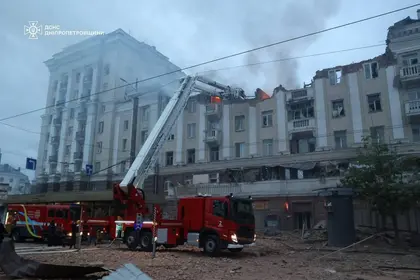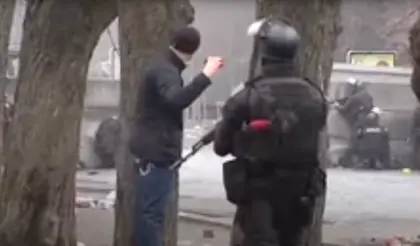Even though Ukraine’s parliament can’t clearly define pornography, lawmakers want to ban it and punish people who possess it – whatever “it” is. That’s got a lot of people shaking their heads in dismay. It also has people worried that a state with democratic aspirations wants to start policing thoughts and images, not actions.
On June 11, the Verkhovna Rada amended the nation’s criminal code to add possession of pornography to the master list of crimes. Punishment ranges from an Hr 850 fine to three years in prison. Previously, the code only targeted people who produced or distributed pornography.
The law was supported by 343 lawmakers, but hasn’t been signed or vetoed yet by President Victor Yushchenko.
But what to punish?
The only working definition, contained in 2003 legislation, doesn’t offer much guidance to law enforcement. It reads more like a scold to people: “Pornography is vulgar, candid, cynical, obscene depiction of sexual acts, pursuing no other goal, the explicit demonstration of genitals, unethical elements of the sexual act, sexual perversions, realistic sketches that do not meet moral criteria and offend honor and dignity of the human by inciting low instincts.”
In other words, the definition is vague and amorphous, and could be stretched to fit almost anything.
“Terms like ‘unethical’ or ‘low instincts,’ for example, are judgmental,” said Olha Bryukhovetska, a professor of Kyiv-Mohyla Academy’s culture department. “Laws shouldn’t include judgmental definitions.”
Moreover, governments the world over have struggled with pornography, how to define it and what to do about it. While explicit sexual and other images may offend many people, liberal democracies have often come down on the side of protecting free speech.
Laws are not supposed to ban ideas or images, free-speech proponents say, they are meant to punish behavior. For instance, child pornography is by definition illegal because it depicts sexual acts with children, which is a crime.
Children are not capable of making the decision to have sex with anyone – especially adults – until they reach the legal age of consent. While Ukrainian law does not clearly define the age of consent, it is considered to be 16, based on precedent.
Even if everyone can agree on what constitutes a pornographic image – and no such consensus exists in the world – the vagueness of Ukraine’s anti-pornography law makes its enforcement ripe for abuse and invasion of privacy.
“If the subject of [what is banned] is unclear, the law passed creates mechanisms with which a great number of people could be brought to trial without really being guilty,” said Yevhen Zakharov, head of the Kharkiv Rights Protection Group.
In a nation where distrust of government, courts, police and many other institutions remains high, parliament’s version opens up many potential avenues for abuse, Zakharov said. For instance, the human rights activist said that police could simply seize private property, declare it pornographic and demand bribes in exchange for not enforcing the law.
A group of lawyers, human-rights defenders and others on June 23 asked President Yushchenko to veto the law. The president received the law on June 17 and has another 10 days to make a decision.
“This law violates my personal right for having my own point of view,” said Yuliya Holishkova, one of many Ukrainian citizens who oppose the legislation. “I don’t want somebody to determine the framework for my personal moral values.”
Justice Minister Mykola Onishchuk, author of the law, sought to calm fears. Onishchuk said that a person would be punished for keeping pornography only if they intended to sell it.
But the explanation didn’t satisfy lawyers and human rights protectors, nor does it clarify the definition of pornography.
Yet another problematic aspect is trying to prove someone was attempting to sell pornography if no official sales agreement exists. Lawmakers say they’ll further refine the law.
“We passed this law as a general direction to set the maximum limits of products which are beyond the moral values of Ukraine,” said Andriy Parubiy, a parliament deputy who voted for it, adding that the parliament will develop pornography’s clear definition.
But Bryukhovetska of Kyiv-Mohyla Academy’s culture department said that clearly defining pornography is, in principle, impossible. She said all such definitions are judgmental and the law needs a more concrete definition. Only child pornography can be clearly defined, she said. For several years, Bryukhovetska worked with a group of experts from Legal Expertise Institute in Kyiv that attempted to develop a definition of pornography that can be used in legislation.
Hennadiy Moskal, a parliamentarian and former police officer, agreed with Bryukhovetska. “Onishchuk went overboard with his law,” he said.
The Justice Ministry, Moskal said, had been asked to develop a law defining child pornography and establishing severe punishment for producing, spreading and keeping it.
Stiffening child pornography laws and punishments is needed for Ukraine to comply with the United Nations Convention on the Rights of the Child, which was ratified by Ukraine and is one of its international obligations. Ukraine has a reputation worldwide for not doing enough to stop the sexual exploitation of children. And polls show that 98 percent of Ukrainians are in agreement about banning child pornography.
According to an international rights organization, End Child Prostitution, Child Pornography and Trafficking of Children, as many as 4 in 10 sex workers in Ukraine are between 11 and 18 years of age. Homeless children, in particular, are recruited into making pornography. According to the Interior Ministry, pornography production in Ukraine is a $100 million-per-year business and up to 15,000 children are involved.
Somehow, however, lawmakers veered way off track and ended up with legislation that is simultaneously vague and overly broad because it encompasses sexually explicit images involving adults.
“If some people can’t realize their erotic ideas in other ways, let them keep porno films and magazines,” Moskal said.
Meanwhile, artists and others in the cultural sphere are afraid they will become the first victims of the new law.
“If I keep paintings and some of them are of erotic content, and if I want to show them to people, now I may get three years of imprisonment,” said Yevhen Karas, a Kyiv art gallery owner. All museums and libraries employees, as well as painters, photographers and other people who work with bodies could be punished according to the new law, Karas added. To protest against the new law, he promptly opened an erotic exhibition in his gallery on Andriyivsky Uzviz on June 23.
“This law makes it possible to ban the greater part of the world’s cultural heritage,” Zakharov added.
Internet users and others have reason to be fearful as well, since anyone who receives “pornographic” information, even unintentionally, can be interpreted as a criminal under the law, Zakharov said.
Les Poderevyanskiy, a writer and painter who attended Karas’ exhibition, agrees that the new law is ridiculous.
“Pornography is the representation of sexual acts. If we say that the representation of a sexual act is a bad thing, then the sexual act is still worse. So let’s ban the sexual act first,” Poderevyanskiy said. “If there will be no sexual acts, there will be no pornography.”
You can also highlight the text and press Ctrl + Enter







Comments (0)